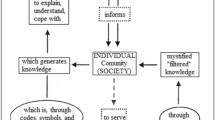Abstract
Working with Navajo Indian informants in Arizona, USA we became aware of the capabilities of children and adults to find their way in vast and clearly “chaotic” canyons. One thing we did was describe what people actually did and said about their ways to find the way back home in such contexts. A second one was to use these data in order to build a curriculum book for a bicultural school on the Navajo reservation. We start from this example to ask what the political choices are, which we confront when working with such material: how much mathematics (or is it Mathematics) is needed in daily life? And what mathematics should we promote or develop, without becoming colonialist again? In Section 2, we discuss the meaning and the status of ethnomathematics, proposing that it would be the generic category which allows for a more systematic and comparative study of the whole domain of mathematical practices. In Section 3, we introduce the concept of multimathemacy (after multiliteracy) to discuss the political agenda of ethnomathematics. We argue that multimathemacy should be the basis of the curriculum in order to guarantee optimal survival value for every learner.
Similar content being viewed by others
References
Adam, S., Alangui, W., & Barton, B. (2003). A comment on: Rowlands and Carson “Where would formal, academic mathematics stand in a curriculum informed by Ethnomathematics? A critical review”. Educational Studies in Mathematics, 52, 327–335.
Ascher, M., & Ascher, R. (1991). Ethnomathematics: a multicultural view of mathematical ideas. Belmont: Brooks/Cole.
Campbell, D. T., Holzner, B., & Shahidullah, M. (1985). Introduction: The comparative study of science and the sociology of scientific validity. Knowledge: creation, diffusion, utilization, 6(4), 307–328.
Cohen, E., Lotan, G., & Rachel, A. (Eds.). (1997). Working for equity in heterogeneous classrooms: sociological theory in action. New York: Teachers College Press.
Cole, M. (1996). Cultural psychology: a once and future discipline. Cambridge: Harvard University Press.
D’Ambrosio, U. (2007). Political issues in mathematics education. The Montana Mathematics Enthusiast, Monograph, 3, 51–56.
D'Ambrosio, U. (1990). The history of mathematics and ethnomathematics. How a native culture intervenes in the process of learning science. Impact of Science on Society, 40(4), 369–377.
Davis, P., & Hersh, R. (1985). The mathematical experience. Albuquerque: University of New Mexico Press.
Farella, J. (1993). Wind in a jar. Albuquerque: University of New Mexico Press.
Hersh, R. (1997). What is mathematics, really? London: Jonathan Cape.
Horsthemke, K. (2006). Ethnomathematics and education: Some thoughts on the allegation of recent developments and current discussions. In: Proceedings of the Third International Conference on Ethnomathematics: Cultural connections and mathematical manipulations, New Zealand.
Horsthemke, K., & Schäfer, M. (2006). Does ‘African’ mathematics facilitate access to mathematics? Towards an ongoing critical analysis of ethnomathematics in a South African context. Proceedings of the Third International Conference on Ethnomathematics: cultural connections and mathematical manipulations, New Zealand. Pythagoras 65: 2–9.
Knijnik, G., & Wanderer, F. (2010). Mathematics education, differential inclusion and the Brazilian Landless Movement. In U. Gellert, E. Jablonka, & C. Morgan (Eds.), Proceedings of the Sixth International Mathematics Education and Society Conference, 2 vol., (pp. 283–292). Berlin: Freie Universität.
Needham, J. (1954). Science and civilization in China. Vol III. Mathematics and the sciences of the heavens and the earth. Cambridge: Cambridge University Press.
Organisation for Economic Co-operation and Development/OECD. (2004). Learning for tomorrow's world—first results from PISA 2003. Paris: OECD.
Pais, A. (2011). Criticisms and contradictions of ethnomathematics. Educational Studies in Mathematics, 76, 209–230.
Pelech, J., & Pieper, G. (2010). The comprehensive handbook of constructivist teaching. From theory to practice. Charlotte: Information Age Publishing, Inc.
Pinxten, R., & François, K. (2007). Ethnomathematics in practice. In K. François & J. P. Van Bendegem (Eds.), Philosophical dimensions in mathematics education (pp. 213–227). New York: Springer.
Pinxten, R., van Dooren, I., & Harvey, F. (1983). Anthropology of space. Philadelphia: University of Pennsylvania Press.
Pinxten, R., van Dooren, I., & Soberon, E. (1987). Towards a Navajo geometry. Gent: KKI Books.
Powell, A. B., & Frankenstein, M. (Eds.). (1997). Ethnomathematics. New York: SUNY.
Restivo, S. (1983). The social relations of physics, mysticism, and mathematics: studies in social structure, interests, and ideas. Dordrecht: Reidel Publ. Co.
Rowlands, S., & Carson, R. (2002). Where would formal, academic mathematics stand in a curriculum informed by ethnomathematics? A critical review of ethnomathematics. Educational Studies in Mathematics, 50, 79–102.
Rowlands, S., & Carson, R. (2004). Our response to Adam, Alangui and Barton’s “a comment on Rowlands & Carson ‘Where would formal, academic mathematics stand in a curriculum informed by ethnomathematics?”. Educational Studies in Mathematics, 56, 329–342.
Skovsmose, O. (1994). Toward a philosophy of critical education. Dordrecht: Kluwer.
Skovsmose, O. (2005). Travelling through education. Uncertainty, mathematics, responsibility. Rotterdam: Sense Publisher.
Sollors, W. (1995). Who is ethnic? In B. Ashcroft, G. Griffiths, & H. Tiffin (Eds.), The post-colonial studies reader (pp. 219–222). London: Routledge.
Vithal, R., & Skovsmose, O. (1997). The end of innocence: a critique of ‘Ethnomathematics’. Educational Studies in Mathematics, 34, 131–157.
Author information
Authors and Affiliations
Corresponding authors
Additional information
The paper was presented at the Fourth International Conference on Ethnomathematics ICEm4, Towson, Maryland, USA on July 25–30, 2010.
Rights and permissions
About this article
Cite this article
Pinxten, R., François, K. Politics in an Indian canyon? Some thoughts on the implications of ethnomathematics. Educ Stud Math 78, 261–273 (2011). https://doi.org/10.1007/s10649-011-9328-z
Published:
Issue Date:
DOI: https://doi.org/10.1007/s10649-011-9328-z




